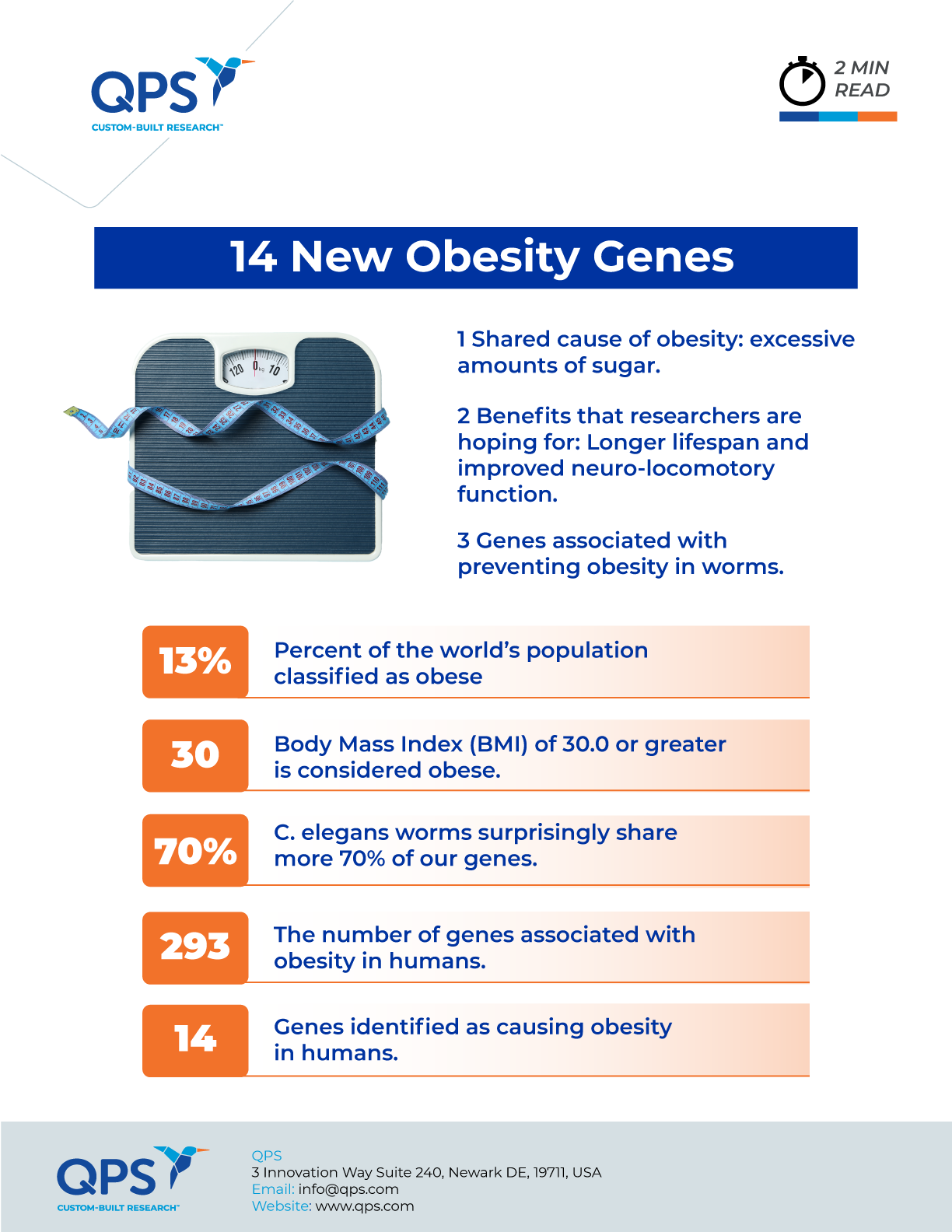The World Health Organization reports that around 13 percent of the world’s population is classified as “obese.” Today, medical experts know that obesity is much more than just a battle with overeating. In fact, obesity is a medical condition largely affected by an individuals’ genetics. As researchers work to develop drugs to treat obesity, exploring the connection between obesity and genetics is more important than ever before. Fortunately, as Science Daily reports, University of Virginia scientists have identified 14 genes that can cause weight gain, as well as three genes that can prevent weight gain. These obesity genes could prove instrumental in treating obesity moving forward.
Exploring Obesity Genes
An individual is defined as “obese” when they exhibit a Body Mass Index (BMI) of 30.0 or higher. Treating obesity isn’t as simple as advising someone to exercise or eat right; the condition goes far beyond lifestyle choices, involving several genes that regulate fat storage and nutrient viability. For years, scientists have sought to understand these genes that convert excessive food into fat. The idea is that “inactivating” these genes with drugs could prove life-changing for individuals with obesity. The question is: How can scientists explore those genes? Eyleen O’Rourke of the University of Virginia led a team to find out. Their key test subjects: humble worms known as C. elegans.
Exploring Obesity Genes
An individual is defined as “obese” when they exhibit a Body Mass Index (BMI) of 30.0 or higher. Treating obesity isn’t as simple as advising someone to exercise or eat right; the condition goes far beyond lifestyle choices, involving several genes that regulate fat storage and nutrient viability. For years, scientists have sought to understand these genes that convert excessive food into fat. The idea is that “inactivating” these genes with drugs could prove life-changing for individuals with obesity. The question is: How can scientists explore those genes? Eyleen O’Rourke of the University of Virginia led a team to find out. Their key test subjects: humble worms known as C. elegans.
Can Worms Help Researchers Explore Human Genetics?
Per Science Daily, the worms used in the University of Virginia study are tiny creatures that live in rotting vegetation and subsist on microbes. Surprisingly, these worms share more than 70 percent of our genes. That’s not all we have in common: Like people, C. elegans worms “become obese if they are fed excessive amounts of sugar,” Science Daily writes. Given our shared genetics, these worms are highly useful in a research capacity. This is why O’Rourke and her collaborators used the worms for their research, which was recently published in the scientific journal PLOS Genetics.
Creating a Worm Model of Obesity
The University of Virginia study required the research team to assess 293 of the genes associated with obesity in humans. The researchers had one goal: to discover which of the genes were actually causing – or, in some cases, preventing – obesity. To accomplish this, the researchers developed a worm model of obesity, feeding some of the worms a high-fructose diet. With the help of machine learning-assisted testing, the researchers were then able to monitor the worms’ weight gain and evaluate the worms’ genes. During that process, the team identified 14 genes that cause obesity, as well as three genes that helped prevent obesity in some worms.
Implications of the Research
Ultimately, the researchers did exactly what they sought out to do. They discovered that enhancing the action of the three genes that prevented obesity also had other benefits: namely, a longer lifespan and improved neuro-locomotory function. Those benefits are two examples of the benefits researchers would hope to deliver via anti-obesity medicines for humans. “Anti-obesity therapies are urgently needed to reduce the burden of obesity in patients and the healthcare system,” O’Rourke said. “Our combination of human genomics with causality tests in model animals promises yielding anti-obesity targets more likely to succeed in clinical trials because of their anticipated increased efficacy and reduced side effects.”
While further research is needed, this study could prove promising as researchers work to reduce obesity in the global population. The use of C. elegans worms to evaluate the human genetic structure is just the latest example of how modeling human disease in other organisms drives the medical community forward.
QPS is a GLP- and GCP-compliant contract research organization (CRO) delivering the highest grade of discovery, preclinical and clinical drug research development services. Since 1995, it has grown from a tiny bioanalysis shop to a full-service CRO with 1,100+ employees in the U.S., Europe and Asia. Today, QPS offers expanded pharmaceutical contract R&D services with special expertise in neuropharmacology, DMPK, toxicology, bioanalysis, translational medicine and clinical development. An award-winning leader focused on bioanalytics and clinical trials, QPS is known for proven quality standards, technical expertise, a flexible approach to research, client satisfaction and turnkey laboratories and facilities. Through continual enhancements in capacities and resources, QPS stands tall in its commitment to delivering superior quality, skilled performance and trusted service to its valued customers. For more information, visit www.qps.com or email info@qps.com.








